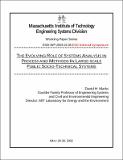| dc.description.abstract | The ESD definition of Large-Scale Socio-Technical Systems is large-scale and complex systems in which both human and non-human elements interact where the social and/or management dimensions tend to dominate. The word public has been added here to indicate that subset which are quasi public systems, i.e. the problems of public management of resources such as clean air and water or energy in which public policy is needed to drive and set the context for public investment and regulation which in turn influence private individual and corporate decisions. Systems analysis plays an important role in the formation of strategic policy for managing these resources. The paradigm of systems analysis as applied to large-scale open systems has not changed over the years. It is still the mantra of Problem Identification, Systems Modeling, Generation of Alternatives (Optimization), Evaluation and Implementation. However, both the process by which systems analysis is carried out, and the systems methods used in that process have evolved significantly and for the better. This paper deals with a description of these evolving methods and processes in the context of large-scale energy and environmental systems. In particular, pathways to the future in energy and environmental management are discussed as long-term system analysis problems. Systems Analysis process changes and methods changes, which have occurred and will need evolution in the future, are identified. | en_US |
